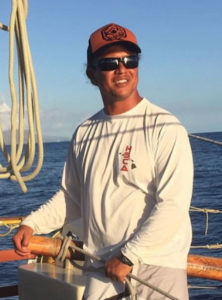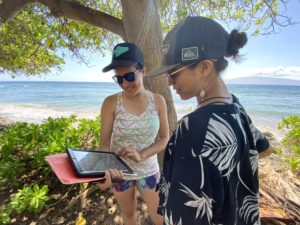Know Your Ocean: Why some people care about Maui’s reefs — and others don’t.
Have you ever wondered why some people care — and others seemingly don’t — about protecting Maui’s coral reefs? Imagine if you could climb into their minds to understand what causes visitors and residents of Maui to be motivated (or not) to care for our reefs through their behaviors and actions. How would that help your community be more effective in protecting its reefs?
Find out more about the social and psychological factors that influence human behavior in our nearshore environments, based on a recent joint study conducted in West Maui by Polanui Hiu, The Nature Conservancy, and Stanford University.
You’ll meet Francisca (Kika) Santana, the leader of the study and a fourth-year PhD candidate at Stanford’s Emmett Interdisciplinary Program in Environment and Resources. Her team surveyed 300 reef users and learned about their reef-based activities, perceptions of reef health, their social-psychological indicators (such as place attachment and self-efficacy), and pro-environmental behavioral intentions. Alana Yurkanin, Maui Marine Project Manager at The Nature Conservancy, will also share her insights on the survey results.
During the webinar, you’ll also be transported to Polanui, a small, popular beach in Lāhaina, protected by an offshore reef named Nā Papalimu O Pi‘ilani. For generations, this reef sustained Hawaiian families with its abundance of fish and edible limu (algae). Sadly, that abundance has vanished and Polanui now has the lowest fish biomass in Hawai’i, meaning its fish are smaller and fewer than all other sites surveyed across the state.
You’ll meet Ekolu Lindsey and the Polanui Hiu, a local community group that he co-founded that works to restore the resources and Hawaiian traditions once practiced along this shore. Find out about their work and the results of recent human use and creel surveys conducted at Polanui (surveys of beachgoer and angler activity in the nearshore waters of this area).
“Let’s learn together to find ways to be more effective in bringing about positive change for our reefs, both now while tourism is largely absent, and later when visitors begin to visit Maui again,” says Amy Hodges, Programs and Operations Manager at Maui Nui Marine Resource Council. “This free webinar is offered as part of our Know Your Ocean Speaker Series, offered online due to Covid-19.”
PRESENTERS:
 Francisca (Kika) Santana is a fourth-year Ph.D. candidate in the Emmett Interdisciplinary Program in Environment and Resources (E-IPER). She studies how individuals and groups respond to environmental change and climate risk. Specifically, her research investigates how individuals make protective health decisions in response to wildfire smoke, what motivates coastal users to take pro-environmental action in a declining coral reef environment on Maui, Hawaiʻi, and how communities respond to land loss and restoration efforts in coastal Louisiana. She draws from theories and methods in sociology, environmental and social psychology, and decision science. Before pursuing her degree at Stanford, Francisca worked on energy and marine policy issues in the nonprofit and government sectors. She received a master’s degree in environmental science and management from UC Santa Barbara and a BA in history from Yale University.
Francisca (Kika) Santana is a fourth-year Ph.D. candidate in the Emmett Interdisciplinary Program in Environment and Resources (E-IPER). She studies how individuals and groups respond to environmental change and climate risk. Specifically, her research investigates how individuals make protective health decisions in response to wildfire smoke, what motivates coastal users to take pro-environmental action in a declining coral reef environment on Maui, Hawaiʻi, and how communities respond to land loss and restoration efforts in coastal Louisiana. She draws from theories and methods in sociology, environmental and social psychology, and decision science. Before pursuing her degree at Stanford, Francisca worked on energy and marine policy issues in the nonprofit and government sectors. She received a master’s degree in environmental science and management from UC Santa Barbara and a BA in history from Yale University.
Edwin “Ekolu” Lindsey
Raised on Maui (where he loved visiting his grandparents’ home in Lahaina to surf, swim, and fish in the waters of Polanui), Ekolu graduated from Kamehameha Schools on O‘ahu, and earned a B.B.A. at the University of Hawaiʻi at Mänoa. Ekolu’s parents — Ed Lindsey, a Native Hawaiian and lifelong schoolteacher, and Puanani Lindsey — co-founded Maui Cultural Lands in 2002. Ed Lindsey also co-founded Maui Nui Marine Resource Council in 2007 with marine biologist Robin Newbold. After his father passed away in 2009, Ekolu assumed the role of president of Maui Cultural Lands. He carries forward his family’s legacy of service and their vision of protecting and restoring Hawaiian cultural resources and the marine environment. In July 2015, he completed a ten-day, 500-mile journey aboard the voyaging canoe Hikianalia to the Papahänaumokuäkea Marine National Monument in the Northwestern Hawaiian Islands to conduct reef surveys and fish monitoring to help better manage Hawai‘i’s marine resources. Ekolu also cofounded Polanui Hiu, the first Community Managed Makai Area (CMMA) on Maui. Ekolu is a member of Maui Nui Marine Resource Council’s Board of Directors.
Alana Yurkanin
Alana is the Maui Marine Project Manager at The Nature Conservancy and serves on the Steering Committee of Hui O Ka Wai Ola, a unique community-based ocean water quality monitoring program on Maui. Alana grew up in Hawai’i with a fisherman as a father. From all of her time spent in and around the ocean, she wanted to protect and continue to understand the environment along and beyond the coast – as well as the people and culture so intrinsically connected to our surroundings. In 2014, she completed a Master’s degree in Environmental Science and Management with a specialization in Coastal Marine Resource Management and a focus in Strategic Communications at the Bren School, UC Santa Barbara. During her program at Bren, she focused her studies on topics relevant to natural resource management, fisheries management strategies, storytelling, communication and media, coastal ecology, project management, and marine science. Additionally, she has a background in environmental education, marine science education, outdoor education, ecotourism, seamanship, team building, international aid work, performing arts, homesteading, and farming.
Special thanks to the County of Maui Mayor’s Office of Economic Development for helping to make this presentation possible.
PHOTO CAPTION:
Kika Santana (left) and Marie Janiszewski (right) review a survey response about reef-based activities, perceptions of reef health, their social-psychological indicators (such as place attachment and self-efficacy), and pro-environmental behavioral intentions.





No Comments
Sorry, the comment form is closed at this time.